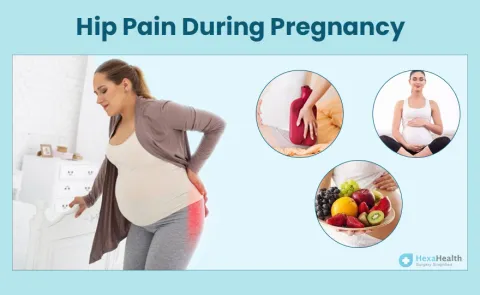Loose Motion in Pregnancy - How to Stop? Top Home Remedies

Quick Summary
- Loose motion during pregnancy is a common issue affecting many expecting mothers
- Various factors can cause loose motion during pregnancy, including hormonal changes, diet or activity level changes, and certain medications or supplements
- Loose motion during pregnancy is often a normal part of the body's response to the many changes happening during this time
- However, it's still important to be aware of the potential risks of loose motion in pregnancy, including dehydration, nutrient deficiencies, and other health concerns
Table of Contents
- Is loose motion normal during pregnancy?
- Why does loose motion happen in pregnancy?
- Other factors causing loose motions in pregnancy
- Symptoms of loose motion during pregnancy
- Home remedies for loose motion in pregnancy
- How to prevent or avoid loose motion during pregnancy?
- When to see a Doctor?
- Conclusion
- Frequently Asked Questions
- References
Diarrhoea, or loose motion in pregnancy, is a common issue affecting many expecting mothers. Various factors, including hormonal changes, diet or activity level changes, and certain medications or supplements, can cause loose motion during pregnancy.
Loose motion during pregnancy is often a normal part of the body's response to the many changes happening during this time. However, it's still important to be aware of the potential risks of loose motion in pregnancy, including dehydration, nutrient deficiencies, and other health concerns.
This article will discuss the causes, symptoms, and treatment options for loose motion during pregnancy. We will also provide some tips for preventing loose motion during pregnancy.
Is loose motion normal during pregnancy?
Experiencing more than three loose bowel movements daily indicates loose motion or diarrhoea. Three types of diarrhoea are clinically diagnosed. These include the following:
- Acute watery diarrhoea (this type of diarrhoea lasts for a few hours or days)
- Acute bloody diarrhoea (It is otherwise also known as dysentery)
- Persistent diarrhoea (This type of diarrhoea lasts for more than 14 days)
Loose motions during the third trimester of pregnancy occur due to the peak hormone levels and the uterus being at its maximum size, preparing for delivery. It may also indicate that labour is approaching, but it does not necessarily mean premature birth or immediate delivery. However, if there are significant changes in bowel habits, it is crucial to seek medical attention.


Why does loose motion happen in pregnancy?
Various factors may cause loose motion in pregnancy. These factors may be related to pregnancy or include factors other than pregnancy. Loose motion can happen in early pregnancy due to the following factors:
Pregnancy-related causes of loose motions in pregnancy
Loose motion in pregnancy is common. Several reasons may cause loose motion in pregnancy. Some of the common pregnancy-related causes of loose motions in pregnancy include the following:
- Hormonal changes: A woman's body goes through various changes during pregnancy. Changes in hormones during pregnancy are widespread. These hormonal changes during pregnancy may interfere with digestion and cause loose motions during pregnancy. For example, an increase in the level of prostaglandins during pregnancy may cause pregnancy-induced loose motions.
- Dietary changes: Pregnant women often experience food aversions and cravings, leading to changes in their diet. These dietary changes during pregnancy can affect the digestive system and cause loose motions during pregnancy.
- Growing of the uterus: As the uterus grows and enlarges during pregnancy, it can add pressure on the digestive tract and cause bowel changes, which may lead to loose motion in pregnancy.
- Prenatal vitamins: The prenatal vitamins taken by pregnant women may also be the reason for experiencing loose motion during pregnancy. Diarrhoea may occur as a side effect of prenatal vitamins. Hence, it is essential to inform your healthcare provider about the vitamins if it is causing loose motions.
- Newfound Food sensitivities: It is common to develop sensitivity towards certain foods during pregnancy. The foods that were digested and tolerated earlier may cause gastric issues and loose motion during pregnancy.
Other factors causing loose motions in pregnancy
Where loose motion in pregnancy is usually caused due to pregnancy-related factors, there are some instances in which loose motions can occur due to other non-pregnancy-related factors. These other factors causing loose motions in pregnancy include the following:
- Infections: Certain infections may occur during pregnancy due to consuming contaminated water or food. Additionally, women who travel to places infected by microorganisms may also be at risk of loose motion during pregnancy due to the contraction of certain infections. These infections may lead to loose motion in pregnancy, called infectious diarrhoea. The following microorganisms may cause loose motion during pregnancy: Bacteria such as E. coli, salmonella, Campylobacter, or Shigella genera. Viral infections are caused by rotavirus, viral gastroenteritis, norovirus, and Parasites such as Cryptosporidium enteritis.
- Bowel disorders: When experiencing loose motion in pregnancy, you must check whether you have any bowel conditions. Specific bowel problems like irritable bowel syndrome (IBD) and ulcerative colitis may cause loose motion during pregnancy.
- Food poisoning: It is common to have cravings during pregnancy. In some cases, eating food or consuming unhygienic or low-quality water can cause food poisoning. Loose motion during pregnancy may occur as a result of food poisoning.
- Stress: Feeling stressed during pregnancy is normal. Giving birth and bringing a new life into the world can be overwhelming. Heightened emotions and anxiety during pregnancy may cause loose motions.
- Other conditions: Some other conditions that may cause loose motion during pregnancy include traveller's Diarrhea, celiac disease, and Crohn's disease.
Symptoms of loose motion during pregnancy
The various symptoms that may be a sign of loose motion during pregnancy include the following:
- Having watery loose stools three or more than three times a day
- Pain in the abdomen or cramps
- Nausea and vomiting
- Constant urge to go to the loo
- Weakness
- Bloating
Home remedies for loose motion in pregnancy
In some cases, loose motion in pregnancy may clear up on its own in a few days. Specific home remedies may be used for loose motion in pregnancy, as it is unsafe to self-medicate. Home remedies that can help with loose motion in pregnancy include the following:
- Hydration: loose motion during pregnancy may cause loss of water and electrolytes. Hence, it is essential to drink plenty of fluids to avoid dehydration. Water, electrolyte solutions, juices, broths, and coconut water are good options for staying hydrated during pregnancy.
- Eat a healthy diet: Eating a healthy balanced diet may help in better digestion. To ease loose motion in pregnancy, eat bland foods such as bananas, toast, saltine crackers, rice, carrots, toast or potatoes.
- Take probiotics: Probiotics, which are live microorganisms that can help balance the gut microbiome, may help treat loose motion during pregnancy.
- Take adequate rest: Exercising must be avoided when having loose motions during pregnancy. Additionally, loose motions may cause weakness; hence good rest is to be taken to recover from loose motions during pregnancy.
How to prevent or avoid loose motion during pregnancy?
Loose motion in pregnancy can be avoided by following the below-mentioned tips:
- Drink clean water to avoid the risk of infections or food poisoning
- Avoid foods that can trigger or worsen loose motion during pregnancy, like Spicy, fried, fatty foods, dairy products, sodas and sugary drinks, foods containing gluten
- Avoid eating food outside as it may be unhygienic and contaminated. Instead, eat home-cooked meals.
When to see a Doctor?
Seeking a doctor immediately when loose motion persists for longer than usual is essential. Inform your doctor if you experience any of the below-mentioned symptoms along with loose motions in pregnancy:
- Dark yellow coloured urine
- Severe stomach pain
- Dryness and stickiness in the mouth
- Decrease in urine output
- Vomiting blood
- Cramps in the lower abdominal region
- Rectal pain
- Thirst
- Dizziness
- Lightheadedness
- Fever
- Headache
- Vaginal bleeding
- Sudden loss of weight
- Bloody stools
Conclusion
Loose motion during pregnancy is a common occurrence that various factors can cause. While it is usually not a serious issue, it can cause discomfort and dehydration, leading to other health concerns if left untreated. It is essential to know the potential causes and symptoms of loose motion in pregnancy and to speak with a healthcare provider for a proper diagnosis and treatment plan.
By taking preventive measures and following the treatment plan recommended by a healthcare provider, most cases of loose motion in pregnancy can be successfully managed, allowing expecting mothers to enjoy a healthy and comfortable pregnancy. At HexaHealth, we are committed to providing exceptional care for pregnant women, with a range of services designed to ensure the health and safety of both mother and baby. Our team of experienced healthcare professionals ensures that every patient receives the best care during pregnancy.
Frequently Asked Questions
Is loose motion in pregnancy common?
Yes, loose motion or diarrhoea is a common digestive problem that many pregnant women experience. Hormonal changes, dietary changes, and stress can contribute to loose motion during pregnancy.
Is loose motion during pregnancy normal?
Yes, loose motion during pregnancy is normal, and most women experience it. However, it is essential to seek medical advice if the symptoms are severe or persistent.
What causes loose motion in early pregnancy?
Loose motion in early pregnancy can be caused by various factors such as hormonal changes, stress, dietary changes, food sensitivities, growing uterus, bowel disorders, infections, and food poisoning.
Is loose motion during pregnancy third trimester common and normal?
Loose motion during pregnancy in the third trimester can be shared and expected as the body prepares for labour and delivery, leading to more frequent bowel movements. However, immediate medical attention is vital if the loose motion is severe, prolonged, or accompanied by other symptoms such as dehydration or abdominal pain.
At what stage of pregnancy does diarrhoea occur?
Although diarrhoea can occur at any stage during the pregnancy, it is more common during the early and third trimesters. In early pregnancy, loose motion may occur due to changes in the body. On the other hand, loose motion in the third trimester may occur as the body prepares for delivery.
Can loose motion in pregnancy cause miscarriage?
In general, occasional episodes of loose motion during pregnancy are not likely to cause miscarriage, primarily if the condition is managed correctly. However, suppose loose motion persists for an extended period or is accompanied by other severe symptoms such as abdominal pain, fever, or dehydration. In that case, it is essential to seek medical attention promptly to prevent potential complications that may increase the risk of miscarriage.
What are the home remedies for loose motion in pregnancy?
Home remedies that can help with loose motion in pregnancy include the following:
- Hydration
- Eating a healthy diet
- Taking probiotics
- Taking adequate rest
What should I eat to stop loose motion during pregnancy?
To stop loose motion during pregnancy, it is advised to eat bland foods such as:
- Rice
- Carrots
- Saltine crackers
- Toast
- Banana
- Potatoes
Is curd good for loose motions during pregnancy?
Yes, curd can be beneficial for loose motions during pregnancy. Curd contains live and active cultures of beneficial bacteria that help restore gut flora's balance. Additionally, the curd is a good source of protein and calcium, which can help support a pregnant woman's nutritional needs. However, choosing plain, unsweetened curd is essential, as added sugars can aggravate loose motions.
When should I worry about loose stools in pregnancy?
You should worry about loose stools in pregnancy and seek immediate medical attention if you notice any of the following symptoms along with loose motions,
- Dark yellow coloured urine
- Dryness and stickiness in the mouth
- Decrease in urine output
- Vomiting blood
- Cramps in the lower abdominal region
- Rectal pain
- Vaginal bleeding
- Sudden loss of weight
- Bloody stools
What to do in loose motion in pregnancy?
If you are experiencing loose motion during pregnancy, staying hydrated by drinking lots of fluids is essential. Avoid spicy, fatty, or high-fibre foods, as they can further irritate your digestive system and worsen diarrhoea. Instead, avoid bland foods like rice, boiled potatoes, and bananas.
How to stop loose motions during pregnancy?
To stop loose motions during pregnancy, keep yourself hydrated, eat bland foods, avoid spicy foods, and rest properly. Additionally, you may also take anti-diarrheal medicine after consulting your doctor.
Can we take ORS during pregnancy?
Yes, Oral Rehydration Solution (ORS) can be taken during pregnancy to replenish the fluids and electrolytes lost due to loose motions. ORS is considered safe during pregnancy and is often recommended by healthcare providers to treat diarrhoea or loose motions. However, ORS must be taken during pregnancy only after consulting a doctor.
Which is the safest and best medicine to stop loose motion during early pregnancy?
It is always recommended to consult a doctor before taking any medication during pregnancy. The doctor may suggest medication, such as loperamide, considered safe during pregnancy. However, it's important to note that self-medication should be avoided, and medical advice should always be sought before taking any medication.
Does loose motion happen in early pregnancy only?
No, loose motion can happen at any stage during pregnancy. However, it is commonly seen happening in the early and third trimesters.
Does loose stools mean early Labour?
Loose stools alone do not necessarily mean early labour. While some women may experience loose stools or diarrhoea as a symptom of premature delivery, there are many other possible causes of loose stools during pregnancy. Hence, it is best to seek advice from a healthcare provider about loose stools and early labour.
How can I stop loose motion fast at home?
You can stop loose motion fast at home by following these home remedies, which include:
- Hydration
- Eating a healthy diet
- Taking probiotics
- Taking adequate rest
Is beetroot good for a pregnant woman?
Beetroot is a nutritious food for pregnant women. It is a good source of various nutrients which are essential for the health of the mother and the baby. However, it is crucial to consume beetroot in moderation and consult the healthcare provider before adding beetroot or other new food.
When to seek treatment for loose motion in pregnancy?
Seek treatment for loose motion in pregnancy when the loose motion persists and worsens. You should also see a doctor if you notice symptoms such as headache, dizziness, nausea, vomiting, abdominal pain or vaginal bleeding.
What are the risks and complications of loose motion in pregnancy?
The risk and complications of loose motion in pregnancy are dehydration and electrolyte imbalances, which can harm both the mother and the developing baby. Therefore, it is vital to seek medical attention if you experience persistent diarrhoea during pregnancy.
Is it dangerous to have loose motion during pregnancy?
While loose motion during pregnancy can be uncomfortable and inconvenient, it is common and usually not dangerous. However, if it persists long or is accompanied by other symptoms such as dehydration or abdominal pain, it is crucial to seek medical attention.
What happens if you drink salt water while pregnant?
Drinking salt water during pregnancy is not recommended as it can cause dehydration and electrolyte imbalances. High sodium levels can cause water retention, blood pressure and kidney stress. Drinking salt water can sometimes lead to preterm labour or miscarriage.
Last Updated on: 1 March 2023
Reviewer

Dr. Arti Sharma
MBBS, DNB Obstetrics and Gynaecology, Diploma In Cosmetic Gynaecology
9 Years Experience
Dr Arti Sharma is a well-known Obstetrician and Cosmetic Gynaecologist currently associated with Aesthetica Veda in Bengaluru. She has 9 years of experience in Obstetrics and Cosmetic Gynaecology and worked as an expert Obstetrician...View More
Author

An enthusiastic writer with an eye for details and medical correctness. An avid reviewer and publisher. She emphasises authentic information and creates value for the readers. Earlier, she was involved in making ...View More
Expert Doctors (10)
NABH Accredited Hospitals (5)
Latest Health Articles


























 Open In App
Open In App